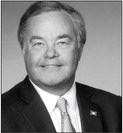Senate considering a number of bills in Special Session

Senate considering a number of bills in Special Session
State Capitol Week in Review From Senator Keith Ingram
LITTLE ROCK – The legislature convened in a special session called by the governor to address highway funding needs.
The governor’s call has 12 items in addition to highway funding. Senate Bill 10, at 105 pages, is easily the longest bill under consideration. It would terminate a list of task forces, commissions and study groups that are no longer in operation and place the Arkansas History Commission under the state Heritage Department.
Several measures are of particular interest to educators, for example, SB 14 would postpone for this school year the use of standardized tests to designate schools as being in academic distress. The impetus for the bill is that this will be the third consecutive year that a different standardized test will be administered to Arkansas students.
Schools can come off of the academically distress list, but they won’t be put on the list based on result of tests taken in the 2016-2017 school year.
SB 1 amends school election laws to prevent confusion at voting places in November. The state Education Commission relied on a new state law that gives school officials the option of setting elections in November or the traditional date in September. He set elections for the Pulaski County and Helena-West Helena School Districts for November 8, the same date as the general election. Those districts are coming out from under state control and will elect school boards.
However, others laws still on the books say that school elections cannot coincide with other elections.
Unless the legislature changes those laws, about 70,000 voters would have to stand in two separate lines in November if they wanted to vote for both president and school board candidates. About 7,000 voters would be even more inconvenienced. They would have to vote at two separate polling places, because their voting precincts for the general election don’t correspond exactly with their school district zones.
Also, there would be substantial costs to hire additional poll workers and open additional voting places. Districts would have to reimburse counties for those extra costs.
Last year’s heavy rains caused flooding across Arkansas and many residents discovered that repairing broken levees is not only expensive, it can be impossible to figure out who is responsible. That’s because some local levee boards have vacancies or no longer meet.
SB 3 sets up a process for filling vacancies in which county judges make appointments based on the votes of landowners within a levee or drainage district.
Assessing the conditions of levees and filling vacancies on local levee boards are first steps toward repairing levees that have failed or are in danger of failing.
SB 8 loosens confidentiality restrictions that now govern the reporting of juvenile offenses. The restrictions protect the privacy of juveniles. SB 8 allows legitimate researchers to access juvenile detention data so they can assess and improve the effectiveness of intervention programs. To do this, they need to know which juveniles are high-risk and low-risk, and which programs they have been sent to.
SB 9, known as the Frank Broyles Publicity Rights Protection Act, allows a person to copyright their image, signature, voice and likeness. That right would not expire at the person’s death and could be transferred to family members, similar to how property rights are transferred in a will.



Share